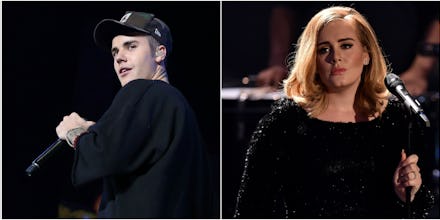Adele May Have Dominated Pop in 2015, but Justin Bieber May Have the Last Laugh

There was only one artist worth discussing in pop music at the end of 2015: Adele. The 27-year-old singer returned to music in November with a perfectly executed album drop. She won the world over once again with her fondness for wine and the word "cunt" and smashed sales records dating all the way back to 2000, before the Napster broke the industry. To hear publications like Newsweek, NPR and Billboard tell it, she will be the one to put it back together.
Yet the industry may have spoken too soon when claiming the future of pop music is all Adele's. The omnipresence she enjoyed at the end of 2015 seems to be slowly waning. The London queen's "Hello" started its inevitable decent on the radio and singles charts, only to find it replaced by tabloid favorite Justin Bieber.
Despite dropping a week earlier than Adele's 25, Purpose is only gaining momentum. This week, Bieber achieved the rare feat of replacing himself at No. 1 on the Billboard Hot 100, with his "Love Yourself" trading places with "Sorry," now at No. 2. Bieber may have found himself the subject of more think pieces about dick pics and hairstyles than music industry trends last year, but looking at the staying power his Purpose is currently enjoying, that doesn't seem fair.
As hard as it may be to admit for some, Purpose is great, and it provides a much clearer blueprint of what we can expect pop to sound like in the future than anything out of the Adele camp. Bieber's Purpose is slowly becoming an integral part of the soundtrack defining life in not just 2015, but also 2016.
According to Spotify data, "Sorry" was the second most played song at midnight New Year's Eve, just behind Susan Boyle's rendition of the traditional New Year's goodbye "Auld Lang Syne." Looking to streaming data to find the most important artists, one will come to the Justin Bieber's name far before the Beatles, which released its timeless catalog to the streaming services in December. The Fab Four have not been able to come anywhere near Bieber's tallies. Neither can Adele, for that matter.
The world may really be seeing the rise of the next Beatles-level pop sensation. In November he broke the Beatles' record for most simultaneous Hot 100 hits with 17 of the tracks on Purpose. Of course, the way streaming albums are tallied makes it far easier for Bieber to achieve such a feat. It puts Justin in a separate and more impressive category than his peers, if nothing else.
Bieber's music also has distinguishing feature of having been able to hit with audiences that generally steer as far away from mainstream trends as physically possible. In December Spotify reported "Sorry" was the No. 1 song in the New York's Brooklyn neighborhood of Williamsburg — the mecca of hipsterdom and by extension, musical snobbery. It's Belieber territory now.
Purpose blurs that line between high- and lowbrow music. Its Caribbean-flavored synth-pop production from Skrillex and Jason "Poo Bear" Boyd is simultaneously accessible and unpredictable enough to send dance floors everywhere into hysterics. Adele's 25 is the exact opposite. It's music for crying into one's ice cream tub. While that's trendy in its own way, it is more useful as a personal therapy than as a means to create a collective experience.
We're definitely not at peak Adele yet. She can still walk in front of camera, sing karaoke in a car and break the internet. But that's more a measure of the strength of her persona than her music. 25 was remarkable in the sense that it took the big pop that ballad artists like Aretha Franklin, Diana Ross and Barbara Streisand have belting for decades and prove it can still sell — and sell well. But neither the music nor the release strategy is something many other artists can follow.
Adele's ability to withhold her music from streaming and still have it sell on a massive scale is something music's top 1% can get away with today. Artists need established followings and music familiar enough to guarantee crowds to line the block. Additionally, attempting the simple and meticulously written music Adele did requires a massive time investment. Adele scrapped nearly an entire album before settling for 25's 14 songs.
Purpose, on the other hand, took bigger risks sonically and also provides a much clearer picture of what most pop music will likely sound like going forward. Its kin can already be spotted across the space. Rihanna's minimal and experimental "Work" aims for a similar low-key party vibe as "What Do You Mean?" Zayn Malik's debut single "Pillowtalk" borrows the vocal snippet beat-making styles of "Sorry."
Bieber's music points to the future, and for that reason, Purpose may find itself remembered as a far more significant musical contribution in the long run. Once we're all comfortable admitting Justin Bieber is a talented songwriter, his legacy will be that much more assured.